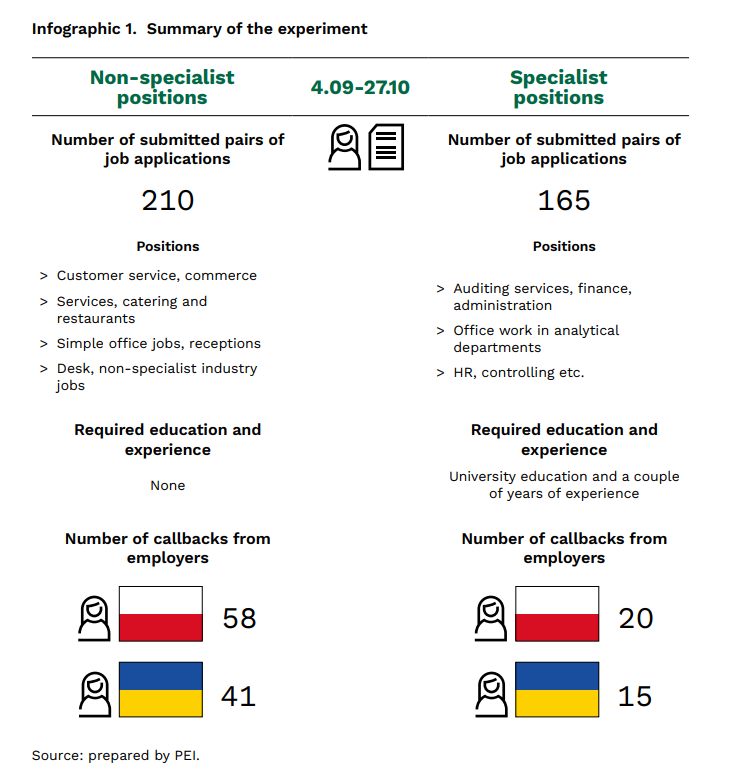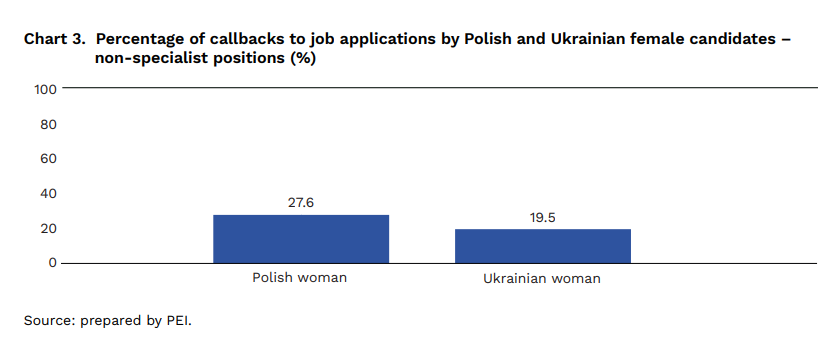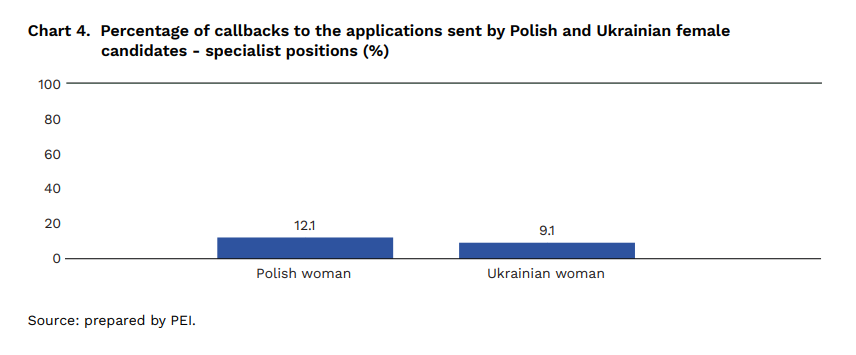65 % Ukrainian refugees work, but face many challenges in the Polish labour market
Opublikowano: 12/03/2024
65% of war refugees who came to Poland from Ukraine are in employment. The employment rate is currently the highest among Organisation for Economic Co-operation and Development (OECD) countries. Research conducted by the Polish Economic Institute shows that Ukrainian refugees face various challenges in the Polish labour market and sometimes experience unequal treatment. In several of the industries surveyed that do not require specialised qualifications, employers respond less frequently to CVs sent by Ukrainian women compared to those sent by Polish women. The difference of nearly 30 % is a signal of potential discrimination at the initial stage of recruitment, according to the latest report by the Polish Economic Institute 'Refugees from Ukraine in the Polish labour market: opportunities and obstacles'.
Poland is one of the countries, along with the United States and Germany, that has taken in the largest number of war refugees from Ukraine. According to UNHCR data, the total number of those arriving in Poland was approximately 960 000, of which nearly 90 % were women and children. The most numerous age group are those aged 27-44 (48 %), followed by those aged 45-59 (24 %) and those under 26 (18 %). Only 9 % are over 60.
Ukrainian refugees in the Polish labour market
The employment rate of refugees in Poland is the highest among the OECD countries, i.e. 65 %, while several other European countries have employment rates above 40 %: the United Kingdom (61 %), Sweden (56 %), Lithuania (53 %), and the Czech Republic (51 %). In contrast, the lowest employment rates are found in Germany (18 %), Switzerland (19 %), and Italy (19 %).
This high rate of refugee employment in Poland was probably significantly influenced by the large number of Ukrainians working in our country before the Russian invasion in 2022. Compatriots were able to help newcomers find employment, housing and provide organisational assistance to facilitate their new situation.
Mostly refugees find employment as blue-collar workers, as well as in tourism and hospitality, manufacturing, logistics, IT, and construction. The best paid refugees (and pre-war migrants) work in IT and transport.
It is noteworthy that refugees are relatively more likely to work below their qualifications than pre-war migrants, 46 % and 32 % respectively. Here, knowledge of the Polish language is key, as it enables better matching of employment to skills and qualifications. The employment rate for refugees with knowledge of Polish was 82 %, while for those without knowledge of Polish was only 50 %.
Challenges of refugees in the labour market
The PEI research included in-depth interviews with refugee women and men from Ukraine. The purpose of the interviews was to understand the interviewees’ experiences, attitudes and challenges to professional and social integration in our country. Interview participants were predominantly women, who make up the majority of refugees arriving in Poland in 2022.
“War refugees are a heterogeneous group of people with different skills, experience and professional ambitions. Despite these differences, they are united by difficulties of an emotional nature, present in the daily challenges of adaptation. These include feelings of loneliness, confusion, uncertainty, lack of family and friends or fears about securing decent living conditions in their new place of residence,” comments Radosław Zyzik, Senior Advisor of PEI Behavioural Economics team. “Some refugees clearly communicate a longing for their country and loved ones, which affects the adaptation process. And the expressed desire to return is compounded by a change in social status and a loss of economic security,” he adds.
“The interviews showed that refugees in Poland face a variety of challenges in the labour market, which often require them to be flexible, resilient and adapt in a new environment. Discrimination based on nationality is not a common phenomenon. Those who have experienced it or have heard of incidents of discrimination point to poor remuneration, exploitation of their vulnerability in the labour market, unequal treatment and workload, and harmful stereotypes. Refugees also face difficulties in having their qualifications recognised and often work below their skills or in the shadow economy. Despite the challenges and difficulties, it must be emphasized that Ukrainian refugees in Poland recognize and appreciate the support they receive – both that provided by public institutions and international organizations, and especially by civil society,” stresses Radosław Zyzik.
CVs of Polish female applicants favoured
PEI’s experiment involved searching for job offers posted on recruitment websites and sending pairs of CVs of fictitious female candidates to them: a Polish woman and a Ukrainian woman arriving in our country in 2022. The application documents were as similar to each other as possible.
The search for offers took place at two levels covering: 1) non-specialist positions that did not require higher education and experience and 2) specialist positions that required higher education and experience.
“The results of the experiment allow us to conclude that in industries that do not require specialised qualifications, employers respond less frequently to job applications sent by Ukrainian women compared to CVs sent by Polish women. The percentage of call-backs was 27.6 % for a Polish candidate and 19.5 % for a Ukrainian woman. Thus, there are indications of potential discrimination against Ukrainian persons at the stage of pre-selection of submitted applications. In the case of positions requiring higher qualifications, this difference was not statistically significant, thus making it impossible to conclude explicitly that discrimination exists. It is worth recalling that experiments of this type are a proven method of demonstrating so-called statistical discrimination and have a variety of applications. In a similar study, PEI demonstrated age discrimination in the Polish labour market,” explains Łukasz Baszczak, Senior Analyst in the Behavioural Economics team.
Discrimination against refugees in the labour market a common phenomenon worldwide
In OECD countries, this form of labour market discrimination has been the subject of research and analysis over the past 25 years. Candidates from ethnic, national, or racial minorities have always had to send significantly more applications in order to be invited for an interview. Similar results in similar experiments have also been obtained in other countries. For example, a study in Sweden observed a significantly lower call-back rate for migrants (2.5 %) than for native Swedes (19 %). It did not matter whether the migrants had work experience or even citizenship.
Research in twenty European countries confirms the fact that forced migrants perform worse in the labour market compared to natives and economic migrants.
***
The Polish Economic Institute is a public economic think tank dating back to 1928. Its research primarily spans macroeconomics, energy and climate, foreign trade, economic foresight, the digital economy and behavioural economics. The Institute provides reports, analyses, and recommendations for key areas of the economy and social life in Poland, taking into account the international situation.
Media contact:
Ewa Balicka-Sawiak
Press Officer
M: +48 727 427 918
E: ewa.balicka@pie.net.pl
Category: Behavioural Economics / Press releases / Report / Reports 2024





